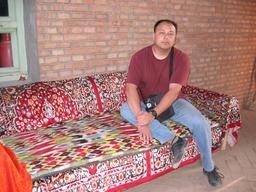
2004.09.06 Urumqi, China

Daily life in Xinjiang is quirky for a variety of reasons. One of the most notable is that no matter where you may be throughout the province, you're functioning within two time zones simultaneously.
Technically all of China is supposed to set their clock to one uniform time. That choice is of course based on where the sun is relative to Beijing--a city far from Xinjiang and unloved by much of the population here. The use of one time zone throughout China is akin to if the United States government were to declare Washington D.C.'s Eastern Time to be the only clock which might be used across the country.
The sun may be at its highest point when striking noon in the capital but it takes two more hours to make it to that same place above Urumqi, then nearly another hour to reach its zenith above Kashgar. The Uighurs, along with other indigenous non-Han people, tend to ignore the concept of this time zone imposed from several thousand miles away. They simply use their own unofficial Xinjiang Time. This presumes the entire province to be two hours behind everywhere else in the country.
Setting Xinjiang clocks to Beijing time doesn't make much sense. People around the world prefer not to function when it's dark outside. So the government offices, banks, and other institutions that are obliged to follow official policy circumvent this problem by shifting business hours to later than they would be held in the eastern cities. Doors at such places tend to open at 10:00, rather than 8:00, to simultaneously address the directive of the central government and serve the local population.
While just using Xinjiang Time would seem a more logical way of operating, the existence of Beijing's clock confounds everything. Posted operating hours on businesses are often qualified with the characters 北京 (Beijing). Arranging to meet with anybody will almost always end with the question "Beijing time or Xinjiang time?" It's a general rule of thumb that the Chinese keep their watches set to the official time, and the ethnic minorities' run two hours behind. However, no matter how carefully appointments are scheduled, everybody is at some point bound to either stand a friend up, or arrive somewhere two hours earlier than they needed to.
It may seem trivial, but the choice of which time zone one uses out here is to a degree politically loaded. Operating on the same time as the bulk of China's population back east doesn't offer much convenience so is largely interpreted as a re-affirmation of just which country Xinjiang is considered a part of. And while it's not much of a rebellion against Beijing rule, it is significant that the locals choose to ignore what is perceived as a silly mandate from the central government.
The actuality of which time people really function at seems to fall somewhere in between. My perception is that those who run their lives by Beijing's clock tend to stay out late. Those who go by Xinjiang time turn in early. For what it's worth, I keep my clocks set to Beijing time. I've always kept late hours, so I think it marginally moves my schedule closer to normal. Staying up until 4:00 A.M. really means going to bed at 2:00. There's no way I would manage to attend my first morning class if I thought of it starting at 7:30, while 9:30 seems perfectly reasonable.
I understand that dividing the world into time zones covering large slices of longitude is a fairly new concept and it was the railroads who first implemented it. Previously, keeping time was a matter left to local authorities. The old arrangement led to trains departing one city and arriving at the same time they left, or sometimes even earlier. The railway companies first divided the U.S. into one-hundred time zones, but this was quickly pared to the four which still exist across the contiguous states.
I'm not sure if there is anywhere else with an equivalent situation of dueling clocks. The closest I've heard of is in the Pamir mountains of Tajikistan, where (according to Princeton Paul, who spent time up there) locals set their clocks to a different time than Dushanbe. I've also heard that all airports and railway stations across the Soviet Union operated on Moscow time, though the cities in which they were housed fell into different time zones. The Daylight Savings Time used during summer months in the United States skews things a bit, especially if living in Arizona or certain counties of Indiana where it's not recognized. Still, none of these are quite the same as having an entire, massive region operating beneath two time zones.
Trivia Point: Crossing between Xinjiang and Afghanistan necessitates the greatest change in clock setting of any land border--3 1/2 hours.